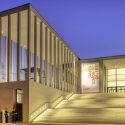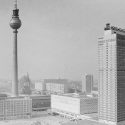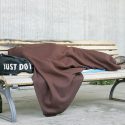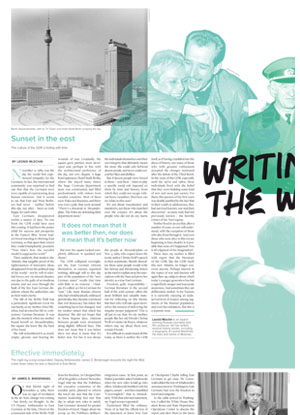The night my scoop evaporated. Deputy Ambassador James D. Bindenagel recounts the night the Wall came down when he was a diplomat in East Berlin
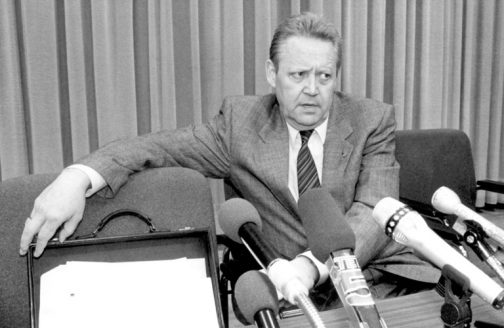
On that fateful night of November 9, 1989, there was no sign of revolution in the air. Sure, change was coming – but slowly, we thought. As the US Deputy Ambassador to East Germany at the time, I lived on the communist side of the Berlin Wall, but I was spending the afternoon in West Berlin at an Aspen Institute reception with leaders from both sides of the divided city. We were absorbed in our day-to-day business; there was no whiff of the excitement that would soon engulf Berlin. Not one of us had an inkling of the events that were about to turn the world upside down.
When the event came to a close, Wolfgang Vogel, the famous East German spy exchange lawyer, asked me for a ride. I was happy to oblige as I hoped to discuss changes to the GDR travel law, the target of his country’s widespread demonstrations for freedom. As I dropped him off at his golden-colored Mercedes, Vogel told me that the Politburo, the executive committee of the socialist party, planned to reform the travel law and that the Communist leadership had met that day to adopt new rules to satisfy East Germans’ demand for greater freedom of travel. Happy about my scoop on the Politburo deliberations, I headed to the US Embassy. Vogel’s comments would make for an exciting report back to the State Department in Washington.
I arrived at the embassy at 7:30 p.m. and went directly to our political section, where I found a much-excited team of diplomats. At a televised press conference, government spokesman Gunter Schabowski had just announced the Politburo decision to lift travel restrictions, leaving everyone at the embassy stunned. East Germans could now get visitor visas from their local People’s Police station, and the East German government would open a new processing center for emigration cases. At that point, an Italian journalist asked Schabowski when the new rules would go into effect. Schabowski fumbled with his papers, unsure – and then mumbled “Unverzüglich,” that is, immediately. With that televised statement, my Vogel scoop evaporated.
Excitement filled the embassy. None of us had the official text of the statement or knew how East Germans planned to implement the new rules. Although Schabowski’s declaration was astounding, it was open to widely varying interpretations. Still dazed by the announcement, we anticipated the rebroadcast the next hour.
At 8 p.m., Jon Greenwald, our political counselor in East Berlin, and I watched as Tagesschau, West Germany’s news program, led with the story. By then, Imre Lipping, a political officer at the embassy, had gathered the official statement and was prepared to report back to Washington. Heather Troutman, another political officer, wrote an on-the-ground report on the guards at Checkpoint Charlie telling East Germans to get visas. Mr. Greenwald cabled the text of Schabowski’s announcement to Washington: East Germans had won the freedom to travel and emigrate.
As the cable arrived in Washington, I called the White House Situation Room and State Department Operations Center to discuss the report and alert them to the latest developments. I then called Harry Gilmore, the US Minister and Deputy Commandant of the American Sector in West Berlin. “Harry,” I said, “it looks like you’re going to have a lot of visitors soon. We’re just not sure yet what that rush of visitors will look like.”
We assumed that, at the earliest, East Germans would start crossing into West Berlin the next day. In those first moments, the Wall remained impassable. After all, these were Germans – and they were known for following the rules. Schabowski had announced the visa rules, and we believed there would be an orderly process. East Germans, however, were following West German television coverage as well and, as it turned out, decided to hold their government to its word “immediately.”
I headed home at around 10 p.m. to watch events unfold on West German television. On my way to Pankow, in the northeast of the city, I was surprised by the unusual amount of traffic. The Trabant – with its two-stroke engine spewing gas and oil smoke and a body made of duroplast, a sort of plasticized pressed-wood – was always in short supply. But on this night, these iconic “Trabis,” as they were lovingly nicknamed, filled the streets in droves despite the late hour. And they were all headed to the Bornholmer Strasse checkpoint, where these same Trabis were being abandoned left and right.
Ahead of me, the blazing lights of a West German television crew led by Der Spiegel reporter Georg Mascolo illuminated the checkpoint. The TV crew, safely ensconced in the West, was preparing for a live broadcast. Despite the bright lights, all I could make out was a steadily growing number of demonstrators gathering at the checkpoint. From the tumult, I could faintly hear shouts of “Tor auf!”, or “Open the gate!”. Anxious East Germans had begun confronting the East German border guards. Inside the complex of the crossing point, armed border police waited for instructions. Amid a massive movement of people, fed by live TV, the revolution that had started so slowly was rapidly spinning out of control.
The question running through my mind was whether the Soviet Army would stay in its barracks. There were 380,000 Soviet soldiers in East Germany. In diplomatic circles, we expected the Soviet Union, a military superpower, would not give up East Germany without a fight. Our role was to worry – the constant modus operandi of a diplomat. But this time, our concern did not last long.
When I arrived home at around 10:15 p.m., I turned on the TV, called the US State Department with the latest developments and then called Harry Gilmore again. “Remember I told you that you’d be seeing lots of visitors?” I said. “Well, that might be tonight.” Just minutes later, together with my wife Jean, I witnessed on live television as waves of East Berliners broke through one checkpoint after the other on their way across the Wall to the West. Lights came on in the neighborhood. I was elated. East Germans had made their point clear. After 40 years of Cold War, East Berliners were determined to have freedom.
James D. Bindenagel
was Deputy US Ambassador to the German Democratic Republic from 1989–1990. He is a former US ambassador and currently the Henry Kissinger Professor for International Security at the University of Bonn.

